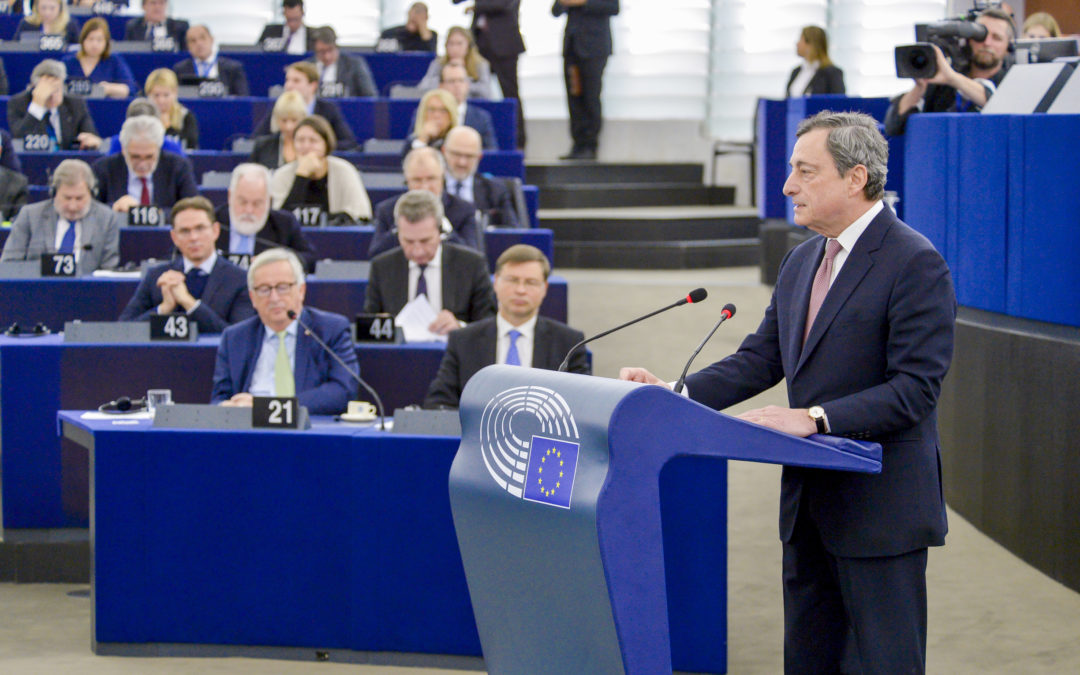In its latest annual resolution on the European Central Bank, the European Parliament has adopted several of Positive Money Europe’s proposals in the area of transparency and governance.
On January 16, the European Parliament published its annual report on the European Central Bank. Although this report is not legally binding, the annual publication has become the cornerstone of parliamentary scrutiny in the Eurozone, as it allows the Parliament to take a public position on a number of issues.
For several years now, the European Central Bank has also shown some level of responsiveness to the Parliament’s recommendations.
Hence, Positive Money Europe pays close attention to the report. As in previous years, we had meetings with most of the MEPs involved in the six-months long negotiation process leading up to the vote last week.
This year, the report was led by right-wing Spanish MEP Gabriel Mato. Although Mato took a somewhat less ambitious approach than his predecessor, the final report includes a number of positive and targeted recommendations for more transparency and governance.
1. Transparency of asset purchases
In particular, the European Parliament calls for more transparency of asset purchase programmes involving bonds issued by the private sector (ABSPP and CBPP3). Those two programmes, which together represent more than 290 billion euros, are particularly opaque among the ECB’s monetary operations. In short, the public have no way to figure out what type of activities are being financed by the programme, nor which financial institutions the ECB has purchased bonds from.
This opacity is particularly incomprehensible, since it contradicts the disclosing standards which the ECB has in place for the corporate bond purchase programme programme (CSPP) – after we put some pressure on them. If the ECB was able to deliver more transparency on CSPP, it can certainly do more on ABSPP and CBPP3.
In fact, Positive Money Europe has filed an access to document request on this particular matter, which, curiously, has been denied by the ECB. We are therefore glad to see the European Parliament strengthening our claim for more transparency and we will ensure that the ECB reconsiders its position on this matter.
In a similar vein, the European Parliament wants the ECB to disclose detailed data on the huge profits made by the Eurosystem, at the expense of Greece and other Southern countries, through the “Securities Markets Programme” since 2010. Again, this section of the report directly responds to one of our campaigns which has been supported by more than 100,000 citizens across Europe.
2. More democratic governance
The European Parliament also adopted a series of resolutions which would improve governance at the central bank. For example, the report reiterates Transparency International’s recommendations – in particular, to reduce the role of the ECB within the Troika as much as possible.
The report also tasks the ECON Committee “to take action to improve the set-up of the monetary dialogue with the ECB President” – a long overdue proposal which we had already submitted to MEPs before last year’s report.
Last but not least, the Parliament urges (once again) the Council of the European Union to improve the current appointment process for ECB’s Executive board members, notably by providing a balanced shortlist of candidates. This resolution is more than relevant as just this week the EU has started to discuss who will replace Mr Peter Praet as board member of the European Central Bank.
Overall, the report constitutes a positive contribution to the Eurozone discussion. The strength of this report is that it pinpoints specific measures that can be taken to make the European Central Bank more accountable and transparent, even though those measures do not always fall within the remit of the ECB itself. Following a trend of recent years, we are also pleased to see a number of Positive Money Europe’s own suggestions be taken on board by MEPs, demonstrating that our advocacy efforts are playing a constructive and meaningful role in this process.
We are naturally committed to continuing to play this role, including by making sure that those points are followed up on by the next ECON Committee after the European Elections.
The report is available on the European Parliament’s website.


So the inspiring Greta Thunberg has got the EU to propose a budget of $1.3 trillion to fight climate change over the next seven years.
but
if the UK is anything to go by the EU’s asset purchase programmes are likely heavily skewed towards the high carbon sector.
and yet
the public have no way to figure out what type of activities are being financed by the programme, nor which financial institutions the ECB has purchased bonds from.
Perhaps we should leverage Greta’s achievement by exposing the probable inconsistencies between what the E U is going to spend on climate change and what its ECB is spending on supporting the high carbon sector?!